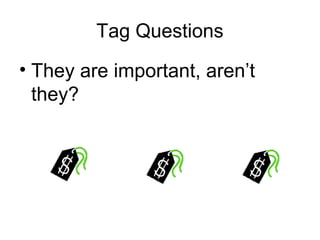Tag questions
•Transferir como PPT, PDF•
11 gostaram•17,546 visualizações
Denunciar
Compartilhar
Denunciar
Compartilhar

Recomendados
Mais conteúdo relacionado
Mais procurados
Mais procurados (20)
Destaque
Destaque (10)
Semelhante a Tag questions
Semelhante a Tag questions (20)
question-tags-grammar-drills-grammar-guides_12899.pptx

question-tags-grammar-drills-grammar-guides_12899.pptx
Tag questions
- 1. Tag Questions • They are important, aren’t they?
- 2. What is a tag question? • It is when a small question is added to a statement, – “Life is good, isn’t it?”
- 3. When do we use tag question? • Tag questions are used in “informal” situations, like talking with your friends. • You do not use tag questions when you are doing formal writing.
- 4. Why are tag questions used? • Tag questions are used to keep the conversation going. • A tag question gives the person you are talking to a chance to respond.
- 5. Example • “It is sunny.” • (thinking: should I say something?)
- 6. • “It is sunny, isn’t it?” • “Yes, it is. I love the sun, don’t you?” • The conversation can continue.
- 7. How do you make a tag question? • To make a tag question you look at the auxiliary (be-verb, helping or linking verb) • If the sentence is positive, change the auxiliary to a negative verb. If the sentence is negative change the auxiliary to a positive verb.
- 8. Example • “The pizza is great.” – “is” is your auxiliary – Change it from a positive to a negative • Isn’t • Use to make a short question “The pizza is great, isn’t it?”
- 9. No auxiliary? • If there is no auxiliary you use do or does • “ I like ice cream, don’t you? • “Sue likes ice cream, doesn’t she?”
- 10. It’s a tag question, isn’t it? • Look carefully to see if a question is a tag question. It must have a statement then a short question. –You can see the board, can’t you? –Can you see the board? • Note in the second example there is no statement, the entire sentence is a question.
- 11. More examples • Pigs can’t fly. • Ask yourself, “What is the auxiliary?” • Is it positive or negative? • How can we change it?
- 12. • Pigs can’t fly, can they?
- 13. Matching It is hot I can’t juggle I like popcorn Dogs are fun aren’t they? isn’t it? can I? don’t I?